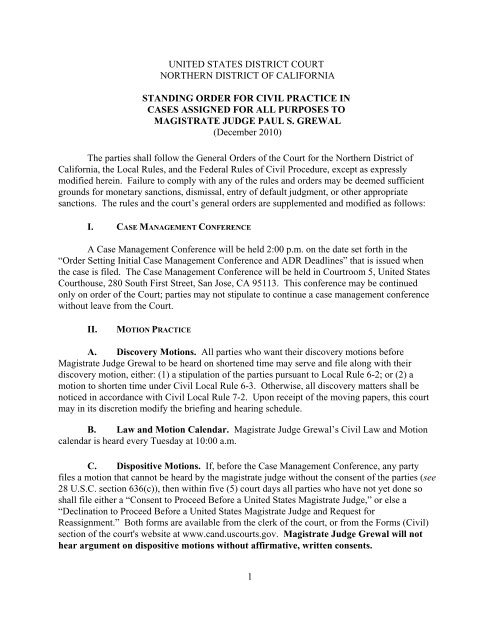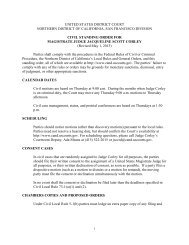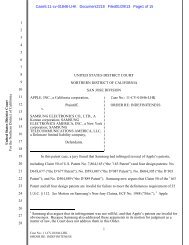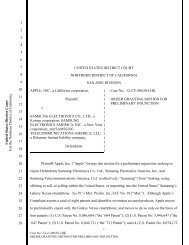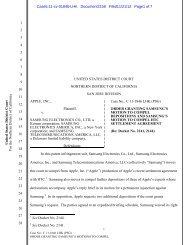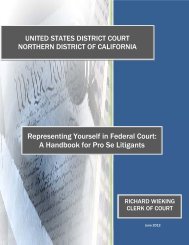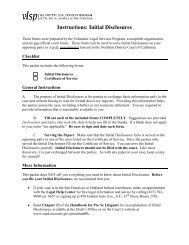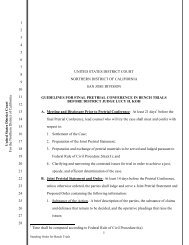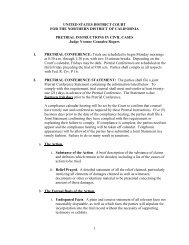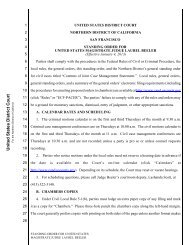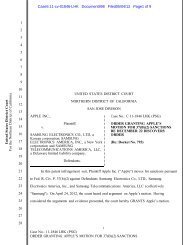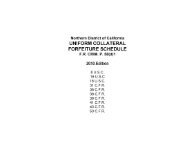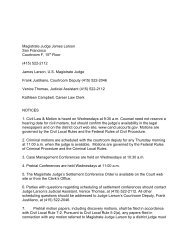Magistrate Judge Grewal's Civil Standing Order (.pdf, 24
Magistrate Judge Grewal's Civil Standing Order (.pdf, 24
Magistrate Judge Grewal's Civil Standing Order (.pdf, 24
You also want an ePaper? Increase the reach of your titles
YUMPU automatically turns print PDFs into web optimized ePapers that Google loves.
UNITED STATES DISTRICT COURT<br />
NORTHERN DISTRICT OF CALIFORNIA<br />
STANDING ORDER FOR CIVIL PRACTICE IN<br />
CASES ASSIGNED FOR ALL PURPOSES TO<br />
MAGISTRATE JUDGE PAUL S. GREWAL<br />
(December 2010)<br />
The parties shall follow the General <strong>Order</strong>s of the Court for the Northern District of<br />
California, the Local Rules, and the Federal Rules of <strong>Civil</strong> Procedure, except as expressly<br />
modified herein. Failure to comply with any of the rules and orders may be deemed sufficient<br />
grounds for monetary sanctions, dismissal, entry of default judgment, or other appropriate<br />
sanctions. The rules and the court’s general orders are supplemented and modified as follows:<br />
I. CASE MANAGEMENT CONFERENCE<br />
A Case Management Conference will be held 2:00 p.m. on the date set forth in the<br />
“<strong>Order</strong> Setting Initial Case Management Conference and ADR Deadlines” that is issued when<br />
the case is filed. The Case Management Conference will be held in Courtroom 5, United States<br />
Courthouse, 280 South First Street, San Jose, CA 95113. This conference may be continued<br />
only on order of the Court; parties may not stipulate to continue a case management conference<br />
without leave from the Court.<br />
II. MOTION PRACTICE<br />
A. Discovery Motions. All parties who want their discovery motions before<br />
<strong>Magistrate</strong> <strong>Judge</strong> Grewal to be heard on shortened time may serve and file along with their<br />
discovery motion, either: (1) a stipulation of the parties pursuant to Local Rule 6-2; or (2) a<br />
motion to shorten time under <strong>Civil</strong> Local Rule 6-3. Otherwise, all discovery matters shall be<br />
noticed in accordance with <strong>Civil</strong> Local Rule 7-2. Upon receipt of the moving papers, this court<br />
may in its discretion modify the briefing and hearing schedule.<br />
B. Law and Motion Calendar. <strong>Magistrate</strong> <strong>Judge</strong> Grewal’s <strong>Civil</strong> Law and Motion<br />
calendar is heard every Tuesday at 10:00 a.m.<br />
C. Dispositive Motions. If, before the Case Management Conference, any party<br />
files a motion that cannot be heard by the magistrate judge without the consent of the parties (see<br />
28 U.S.C. section 636(c)), then within five (5) court days all parties who have not yet done so<br />
shall file either a “Consent to Proceed Before a United States <strong>Magistrate</strong> <strong>Judge</strong>,” or else a<br />
“Declination to Proceed Before a United States <strong>Magistrate</strong> <strong>Judge</strong> and Request for<br />
Reassignment.” Both forms are available from the clerk of the court, or from the Forms (<strong>Civil</strong>)<br />
section of the court's website at www.cand.uscourts.gov. <strong>Magistrate</strong> <strong>Judge</strong> Grewal will not<br />
hear argument on dispositive motions without affirmative, written consents.<br />
1
III. EFFECT OF REASSIGNMENT TO A DISTRICT COURT JUDGE<br />
In the event a case that is originally assigned to <strong>Magistrate</strong> <strong>Judge</strong> Grewal is later<br />
reassigned to a District Court <strong>Judge</strong> in the San Jose Division, and unless otherwise ordered by<br />
the court, the case will remain assigned to <strong>Magistrate</strong> <strong>Judge</strong> Grewal for all discovery matters.<br />
IV. TRIAL PRACTICE (FOR COURT OR JURY TRIAL AS APPLICABLE)<br />
A. Ten (10) Court Days Prior to the Pretrial Conference.<br />
Unless otherwise ordered, if the trial will be a jury trial, the parties shall exchange (but<br />
not file) their respective proposed jury instructions in order to begin preparing the joint set of<br />
jury instructions required by section IV.B.5., below.<br />
Unless otherwise ordered, the parties shall serve and file (or lodge, if so specified) the<br />
following documents:<br />
1. Trial Briefs.<br />
2. Motions In Limine.<br />
3. Depositions and Discovery Responses. One copy of any deposition<br />
transcripts and any other discovery responses either party intends to offer as evidence,<br />
other than solely for impeachment or rebuttal, shall be lodged (not filed) with the court.<br />
The parties shall highlight the pertinent portions of the deposition transcripts and<br />
discovery responses.<br />
4. Proposed Voir Dire Questions (Jury Trials Only). Proposed voir dire<br />
questions shall be filed with the court. The examination of trial jurors shall be conducted<br />
by the <strong>Magistrate</strong> <strong>Judge</strong>. The court will also allow limited follow up voir dire by<br />
attorneys. Juror questionnaires are permitted in limited situations. If the parties wish to<br />
submit juror questionnaires, the parties must contact the court well in advance of the<br />
pretrial conference to discuss procedures.<br />
5. Form of Verdict (Jury Trials Only). In addition to the paper copy, each<br />
party shall also file a proposed form of verdict.<br />
6. Proposed Findings of Fact and Conclusions of Law (for Non-Jury<br />
Trials Only). In addition to the paper copy, each party shall also file Proposed Findings<br />
of Fact and Conclusions of Law.<br />
7. Joint Pretrial Statement. The Joint Pretrial Statement shall include the<br />
following:<br />
2
a. Substance of the Action. A brief description of the<br />
general nature of the action.<br />
b. Stipulations, Agreed Statement and Undisputed Facts. A<br />
statement of: (I) any stipulations requested or proposed for pretrial or trial<br />
purposes; (ii) whether all or part of the action may be presented upon an agreed<br />
statement of facts; and (iii) all relevant facts not reasonably in dispute, as well as<br />
any facts to which the parties will stipulate for the trial record without the<br />
necessity of supporting testimony or exhibits.<br />
c. Disputed Factual Issues. A plain and concise statement<br />
of all disputed factual issues which remain to be decided.<br />
d. Disputed Legal Issues. Without extended legal argument, a plain<br />
and concise statement of each disputed point of law concerning liability, relief,<br />
procedure and/or evidence. (When appropriate, full legal argument with citations<br />
to statutes and case law should be submitted by way of a Trial Brief.)<br />
e. Deposition Excerpts and Discovery Responses. Pursuant to<br />
Fed.R.Civ.P. 26(a)(3), a list of any deposition testimony (by page and lines) or<br />
other discovery responses that each party may offer as evidence at trial, other than<br />
solely for impeachment or rebuttal.<br />
f. Witnesses to be Called. Pursuant to Fed.R.Civ.P. 26(a)(3), a list<br />
of the name of each witness each party expects to call at trial, other than solely for<br />
impeachment or rebuttal, together with a brief statement following each name<br />
describing the substance of the testimony to be given. Each party shall separately<br />
identify those witnesses whom the party expects to call and those witnesses whom<br />
the party may call if the need arises.<br />
g. Exhibits, Schedules and Summaries. Pursuant to Fed.R.Civ.P.<br />
26(a)(3), a list of all documents and other items to be offered as exhibits at the<br />
trial, other than solely for impeachment or rebuttal. Each item on the list shall be<br />
identified by an exhibit number, followed by a brief statement describing its<br />
substance or purpose, and the identity of the sponsoring witness. The parties<br />
must meet and confer on a division of exhibit numbers which will avoid<br />
duplication of numbering. If possible, parties should stipulate to the authenticity<br />
and admissibility of exhibits prior to trial. Any disputes regarding the<br />
authenticity and/or admissibility of any exhibits must be brought to the<br />
court’s attention no later than the Pretrial Conference, or the objections will<br />
be deemed waived.<br />
h. Relief Prayed. A detailed statement of all the relief claimed,<br />
3
particularly itemizing all elements of damages claimed as well as witnesses,<br />
documents or other evidentiary material to be presented concerning the amount of<br />
those damages.<br />
i. Estimate of Trial Time. An estimate of the number of court days<br />
needed for the presentation of each party’s case, indicating any possible<br />
reductions in time through proposed stipulations, agreed statements of facts, or<br />
expedited means of presenting testimony and exhibits.<br />
j. Amendments, Dismissals. A statement of any requested or<br />
proposed amendments to pleadings or dismissals of parties, claims or defenses.<br />
k. Settlement Discussion. A statement indicating whether<br />
further settlement negotiations would likely be productive.<br />
l. Miscellaneous. A statement describing any other subjects relevant<br />
to the trial of the action or material to its just, speedy, and inexpensive<br />
determination.<br />
B. Five (5) Court Days Prior to the Pretrial Conference.<br />
Unless otherwise ordered, the parties shall serve and file the following not less than five<br />
(5) court days prior to the pretrial conference.<br />
1. Oppositions to Motions In Limine.<br />
2. Objections to the use of Deposition Excerpts or other Discovery<br />
Responses. Unless otherwise ordered, any objections to excerpts from depositions, or<br />
other discovery responses, designated in the Joint Pretrial Statement shall be filed in<br />
writing, along with a certification that counsel conferred with opposing counsel regarding<br />
any such objections.<br />
3. Counter-Designations. In the event a party contends that a deposition<br />
excerpt or other discovery response is incomplete without inclusion of addition<br />
deposition excerpts or other discovery responses, the party shall file a<br />
counter-designation listing any additional deposition testimony (by page and lines) or<br />
other discovery responses it contends are necessary for a complete and fair record. Any<br />
objections to the counter-designations shall be served (by mail and electronically, such as<br />
by email attachment or fax) and filed the day before the Pretrial Conference (the after -<br />
hours drop box may not be used for this filing).<br />
4. Objections to Voir Dire and Verdict Forms. Unless otherwise ordered,<br />
4
any objections to use of proposed voir dire or verdict forms shall be filed in writing,<br />
along with a certification that counsel conferred with opposing counsel regarding such<br />
objections.<br />
5. Jury Instructions (Jury Trials Only). The court has a standard<br />
set of preliminary instructions which will be given at the beginning of trial and<br />
standard closing instructions which will be given prior to closing argument based<br />
upon the MODEL JURY INSTRUCTIONS OF THE NINTH CIRCUIT. The parties should not<br />
submit preliminary or closing instructions.<br />
The parties shall file a joint set of all proposed substantive instructions, unless<br />
specific leave to the contrary is granted by the Court. The Court prefers parties to use the<br />
MODEL JURY INSTRUCTIONS OF THE NINTH CIRCUIT or CALIFORNIA JURY INSTRUCTIONS,<br />
modified and supplemented as necessary. The parties shall also submit to the court: 1) an<br />
electronic copy of all proposed instructions, either on fixed media such as a CD Rom<br />
disk, and 2) an additional copy of the proposed jury instructions in a three-ring binder for<br />
the court’s use.<br />
In the event parties are unable to agree on the language of a particular instruction,<br />
the objecting party shall submit an alternative instruction, placed immediately following<br />
the instruction to which an objection is being made, and a brief statement of the ground<br />
for the objection. Challenged instructions must be clearly marked and identified.<br />
Each proposed instruction shall be written in plain language, comprehensible to<br />
jurors, concise and free from argument, cover only one subject which shall be indicated<br />
in the caption, and be written out in full on a separate page. On a separate page following<br />
each instruction, the parties must provide citation to the authority upon which each<br />
instruction is based.<br />
5<br />
Paul S. Grewal<br />
United States <strong>Magistrate</strong> <strong>Judge</strong>


